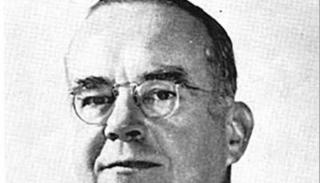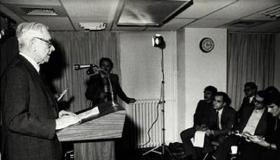
Breadcrumbs navigation
The forgotten history of militant conservatism in IR
Even for those not listening, it is almost impossible not to hear the collective sigh of relief emanating from foreign policy elites across the globe. “Well,” they mutter (or cheer), “thank goodness that is over.” “That”, it hardly needs saying, was the Trump administration’s foreign policy, and the radical conservative forces across the world that gained energy from it.
The sense of relief may well be justified, but the belief that radical conservative movements and governments are now a thing of the past is not. Trump lost because his reckless mismanagement of the coronavirus, outrageous lies, and inability to govern effectively finally caught up with him, not necessarily as a result of the anti-liberal and anti-globalist backlash that his presidency sought to channel. And as his appearance at the CPAC convention showed, he is far from a spent force in American politics. In other parts of the world, radical conservative parties remain in government, and analogous political movements continue to be active and even growing influences on politics and foreign policy. Radical conservatism may be on the back foot, but it is at least an even bet that such movements are not about to fade away.
The roots of today’s radical conservative movements lie not only in globalization’s social and economic dislocations. Nor are they just the product of charismatic leadership. They are also intellectual and ideological. Part of the energy and staying power of these movements stems from their connections to ideological initiatives in the making for decades. Engaging them requires understanding these ideas and how they give rise to distinctive visions of international order and foreign policy. Yet, one of the most striking and troubling realizations of the past four years has been how ill-equipped scholars of International Relations are to deal with radical conservative ideas. Ideas about the ‘liberal international order’ abound, but analyses of conservatism – and especially radical conservativism – are remarkably thin on the ground. If the movements associated with these ideas are unlikely simply to wither away, this presents a crucial intellectual and political weakness.

In a new article published in BISA journal, Review of International Studies, we seek to explain why radical conservative ideas are so notably absent in the study of International Relations. The answer, we argue, lies in the very origins of ‘IR’ as a distinct field of study in the post-war era. When examined closely, this period reveals that although they have almost completely disappeared from the field’s historical memory, radical, or what we call ‘militant,’ conservative ideas were found across large parts of the study of post-war world politics. Focusing on four influential conservative voices in American foreign policy and international affairs: Robert Strausz-Hupé, James Burnham, Stefan Possony, and Gerhart Niemeyer, we show how these conservative thinkers exerted considerable influence over foreign policy debates in the United States and attempted to shape the theoretical foundations of the nascent field of IR.
Expressing skepticism or hostility toward liberal modernity, belief in intrinsic racial hierarchy, and convictions that global orders reflect or ought to reflect deep foundations in culture, tradition, and myth, these thinkers engaged extensively in journalism and public debate, writing best-selling books and influential columns. They lectured frequently to the US military and war colleges and set up training programs based on their ideas. They held government positions or consultancies and advised political leaders and candidates while holding influential academic positions in leading American universities. And yet, significantly, all of them have been almost completely forgotten in accounts of the origins of those institutions and the discipline of IR.
What happened to these once prominent ideas? We argue that their disappearance can be traced in part to the politics of post-war IR and to the activities of post-war thinkers we now call classical realists, who worked to marginalize radical conservative ideas within the legitimate discourse of the field of IR. Realist thinkers were not alone in this endeavour. The post-war social sciences saw sustained efforts to counter the influence of what Daniel Bell called the ‘radical Right’.
Driven by fears of militant anti-communism, these efforts also reflected the advances of the civil rights movement and similar campaigns across multiple academic disciplines and much of modern society to affirm liberal norms of human equality against the racial essentialism and hierarchies characteristic of radical right-wing thought. Post-war American IR developed in this wider context. Concerned that anti-communist and anti-liberal zeal posed tangible threats to peace and democracy, many of the emerging field’s most prominent thinkers directly attacked militant conservatism’s anti-liberal philosophy, foreign policy prescriptions, and racial essentialism. Informed by its aversion to this militant conservatism as well as by its more well-known suspicion toward Wilsonian liberalism, they also sought to produce an alternative, a fusion of liberalism and conservatism designed at least in part to combat the arguments and appeal of the radical Right – a position they called ‘Realism’.
Over two decades, militant conservatism gradually disappeared from the academic field of IR. But it by no means disappeared from the political landscape. Instead, it found a home in para-academic organizations and think-tanks such as the Heritage Foundation, the Hoover Institution, and numerous others, where it contributed to the long and increasingly successful rebellion that the political Right has waged against the ‘liberal consensus’, and which through which it has in recent years again burst into prominence.
The absence of radical conservative ideas from the landscape of International Relations today is not only striking: it is debilitating, leaving both scholars and practitioners (many of whom, after all, are trained in ‘IR’) with limited abilities to understand and react to the challenges these ideas, governments, and movements pose. Returning to this neglected chapter in intellectual history is essential for a fuller understanding of right-wing thought and its attacks on liberal orders in contemporary politics and international relations. It is a history that repays examination not only as a window onto a forgotten past but as an important aspect of the present.
Want to know more? You can read Jean-François and Michael's full article 'The radical Right, realism, and the politics of conservatism in postwar international thought' at DOI: https://doi.org/10.1017/S0260210521000103 It's open access until end of March 2021!
BISA members receive access to RIS (and to our other journal European Journal of International Security) as a benefit of membership. To gain access, log in to your BISA account and scroll down to the 'Membership benefits' section. If you're not yet a member join today.
This article initially appeared on the website of the Center for International Policy Studies. It is reproduced here with kind permission.


